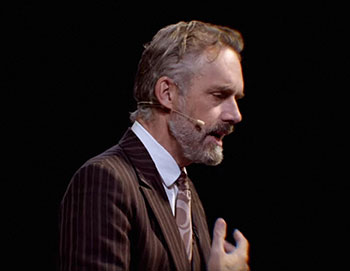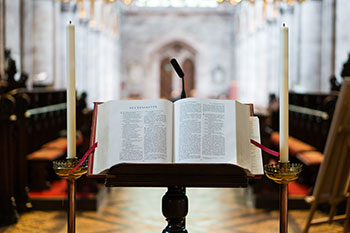
Despite the Bible being the best-selling book of all time — you can fact-check this for yourself — I would honestly have to say that I don’t know a lot of people who read or study this ancient book, or more accurately collection of books, on a regular basis. And the Bible is rarely referred to, or given credence, by secular media or educational institutions.
Thus, it was surprising to me to discover that Jordan Peterson, a Canadian clinical psychologist and, at times, a controversial author and commentator on cultural and political issues was delivering a 15-part lecture series called The Psychological Significance of the Biblical Stories. His lectures presented in 2017 and subsequent podcasts have collected a huge following.
On his website, Peterson writes that the “Bible is a series of books written, edited and assembled over thousands of years. It contains the most influential stories of mankind. Knowledge of those stories is essential to a deep understanding of Western culture.” He also bemoans the fact that so many people do not take the Biblical stories seriously — indeed, to their detriment.
This was an interesting project for Peterson to undertake because he claims not to be a Christian. Yet, as he makes his way through Genesis — and he only gets through that first book of the Bible in almost 38 hours of podcast — he engages the listener in an intellectual and psychological interpretation of the text. He highlights issues that are as relevant now as they were in ancient times: good and evil, suffering, the importance of truth, the moral life. Significantly, he uses the Biblical text to introduce the idea of God. And, in his sometimes-meandering style, he attempts to analyse what God meant for the people of that time and what God might mean for us today.
Now, let us be clear, I am not claiming that everything Peterson espouses would sit perfectly well with Catholic Church teaching. Even US Bishop Robert Barron, a well-known communicator about the Catholic faith who has a high regard for Peterson’s ability to present challenging topics in an intelligent manner, suggests that he falls short when it comes to explaining some important religious truths, such as the historical significance of Jesus.[1]
However, what fascinates me is that Peterson has drawn many people to view the Scriptures in a new light. He has introduced tens of thousands of people to the Scriptures for the first time because the Bible was not taught in their homes or schools. And, it has also not gone unnoticed that Peterson’s predominately millennial-aged audience have had significant engagement with the lectures.
Sometimes it takes people from outside our faith tradition to shine the light on what is one of the most valuable aspects of our faith tradition — the Word of God.
[1] https://www.wordonfire.org/peterson/ - Thoughts on the Jordan Peterson interview
Words for the Journey

On February 7, Catholics will celebrate Word of God Sunday for the first time in Australia. This day in the Church’s calendar was instituted by Pope Francis on September 30, 2019, the 1600th anniversary of the death of St Jerome, a renowned Scripture scholar. The document promulgating the Sunday of the Word of God is called Aperuit Illis. This title comes from the opening lines of the Apostolic Letter, “He opened their minds to understand the Scriptures” (Lk 24:45).
There is a view, and to a certain extent it’s an accurate view, that Catholics have not engaged with the Scriptures as well as our Protestant brothers and sisters. But over recent decades there have been many attempts to encourage Catholics to connect more closely with the Word of God. A day dedicated to holy Scripture is one way of stressing its importance.
Now, what do we mean when we say the “Word of God’ in this context? If you go to Mass on a Sunday, you will hear three pieces of Scripture: the First Reading, Second Reading and the Gospel. At the conclusion of each reading, the reader says either, “The Word of the Lord” or “The Gospel of the Lord”.
We know that various people wrote the Scriptures — for example, Paul, Matthew, Mark, Luke and John — so why do we say it is God’s Word? Well, we can find the answer in Scripture itself. In Paul’s letter to Timothy he writes, “all Scripture is inspired by God and profitable for teaching, for reproof, for correction, and for training in righteousness” (Timothy 3:16). We believe that God’s Holy Spirit inspired the authors of the books of the Bible. That is, “sacred Scripture, by the working of the Holy Spirit, makes human words written in human fashion become the Word of God”.[2]
Pope Francis’ final words in Aperuit Illis express his desire that we take a fresh look at Scripture. He writes:
May the Sunday of the Word of God help his people to grow in religious and intimate familiarity with the sacred Scriptures. For as the sacred author taught of old: “This word is very near to you; it is in your mouth and in your heart for your observance”.[3]
There are many ways we can immerse ourselves in sacred Scripture, some of these are noted below.
Links and useful information
1. CEC Website – Scripture https://catholicenquiry.com/faq
2. Word of God Sunday website: https://www.catholic.org.au/wordofgodsunday
3. Advent and Lenten resources from your diocese are usually based on Scripture and are a good way to engage in the Biblical texts. If you have difficulties accessing these, please contact us: This email address is being protected from spambots. You need JavaScript enabled to view it.
4. Excellent commentary on the weekly readings via a podcast: Dr Brant Pitre’s The Mass Readings Explained https://catholicproductions.com/pages/shogun-mass-readings-explained-subscription (subscription fee for podcast)
5. The Bible in a Year Podcast from Ascension Press (free): https://ascensionpress.com/pages/biy-registration
Going deeper: Catholics and Scripture
The topic “Catholics and Scripture” could be approached in a variety of ways. Covering everything that could be said is not possible with limited space. To this end, the following article from the Catholic Enquiry Centre website seeks to answer one question: What are a few things it would be useful to be aware of about the way Catholics seek to respond to the Scriptures in their journey of faith?
[2] Aperuitt Illis, paragraph 9, http://www.vatican.va/content/francesco/en/motu_proprio/documents/papa-francesco-motu-proprio-20190930_aperuit-illis.html
[3] Aperuitt Illis, paragraph 15 and Dt 30:14
Words: Sharon Brewer
Images: Jordan Peterson, Alamy images
Bible, Unsplash, Stephen Radford
This article is part of Faith Journey, a newsletter from the National Centre for Evangelisation.



